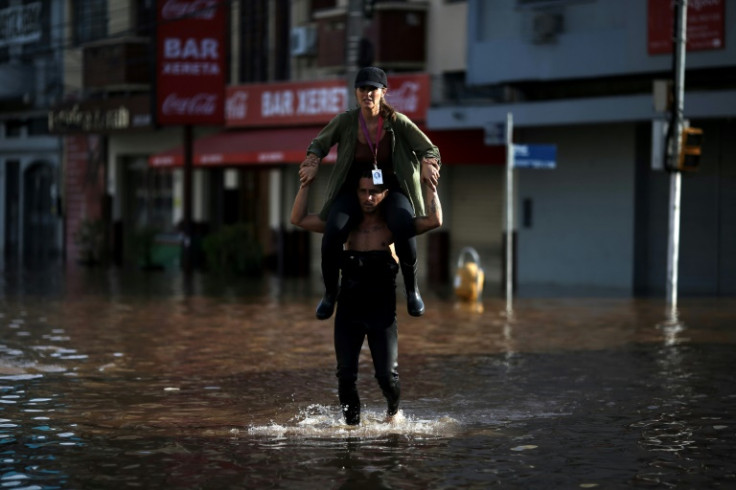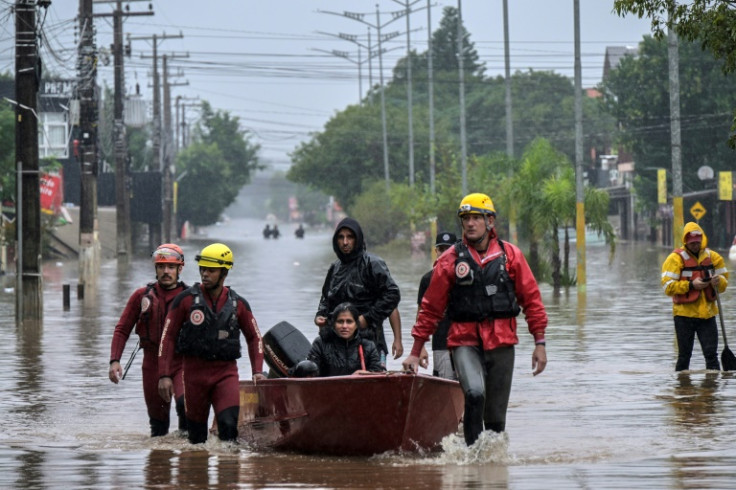
São Paulo, Brazil – Heavy rains have battered southern Brazil for nearly a month. So far, 157 people have died, 94 are missing and 806 more have been injured in Rio Grande do Sul, the country's southernmost state. Authorities say that 616,000 are still homeless.
It is the largest natural disaster in the state's modern history, with entire cities underwater, including many parts of its capital, Porto Alegre. The city, home to 1.5 million people, sits on the eastern bank of Lake Guaíba, which overflowed its banks and flooded the city amid heavy rainfall in May.
Even with rescue efforts still underway, discussion is shifting towards how to build back and what went wrong for the situation to become so bad.
Changes to Rio Grande do Sul's environmental code
Some climate lawyers point to recent relaxations of environmental protection laws as potentially worsening the impact of the climate disaster in southern Brazil.
In 2019, Rio Grande do Sul Governor Eduardo Leite pushed changes to 480 articles from the state's environmental code through the state legislature, effectively relaxing many environmental protection laws.
"I want to congratulate the 37 deputies who voted in favor of a reform of our Environmental Code, so that we can enable the State to grow by protecting the environment," he reportedly said at the time.
According to Luciana Ricci Salomoni, a member of the Latin American Climate Lawyers Initiative for Mobilizing Action (LACLIMA), "the dismantling of socio-environmental legislation had a direct impact on the increase in fires, deforestation, invasions of indigenous territories, illegal mining and violence in the Legal Amazon" across Brazil.
"Both in Rio Grande do Sul and at the federal level, the dismantling of laws was done to favor agribusiness," Salomoni told The Latin Times. According to a study published by Salomoni and two colleagues from the Universidade Federal do Paraná and Centro Universitário Curitiba, the country witnessed a disarticulation of environmental standards and a will to combat environmental crimes between January 2019 and August 2022.
During this time period, President Jair Bolsonaro actively encouraged miners and loggers to extract from protected territories such as Indigenous lands.
Salomoni believes that the devastation in Rio Grande do Sul is the result of climate change, a process exacerbated by negligence, omission and the abrupt reduction of public policy to protect the environment.
"Among the challenges that Rio Grande do Sul will have to face after this extreme climatic event are the review, reconstruction and strengthening of socio-environmental legislation, as well as the agencies responsible for its supervision and application," she said.

Going forward, state and federal governments must enforce environmental protection laws to better prevent more such tragedies, according to Júlia Trevisan, Wildlife Campaigns Coordinator at World Animal Protection, a London-based non-profit.
"Environmental dismantling is happening at a national level, impacting all Brazilian biomes and driving the frequency of extreme events," said Trevisan in an emailed statement.
Back in 2019, when Governor Leite was pushing through his changes to environmental protection laws, NGOs were already sounding alarms about the possible implications.
The Movement of People Affected by Dams, for example, classified the changes as "extremely serious and worrying." The NGO said at the time that the changes would result in "a series of environmental impacts that will affect thousands of people on the horizon."
The state government, on its end, has denied that the changes to the laws have relaxed environmental protection. Leite said this week that the government just "updated procedures" and that it's not possible to link current flooding to the changes in regulations.
In an interview with local outlet Folha de S.Paulo, however, Leite admitted that studies warned about the possibility of climate tragedies in the state. But he said that at the time the government's priority was adjusting finances.
Aid to Rio Grande do Sul
With rescue work still underway and aid being sent to victims, authorities are already starting to think about rebuilding Rio Grande do Sul.
To help with the task, the federal government created an Extraordinary Ministry of Support for the Reconstruction of Rio Grande do Sul, responsible for centralizing and coordinating reconstruction initiatives with the state government and the affected municipalities.
Some benefits have been distributed to victims, with emphasis on providing short-term aid of R$ 5,100 (USD $1,000) from the federal government for all affected families so that they can replace furniture and other belongings lost in the floods. The estimate is that around 240,000 families will receive the aid, totaling R$ 1.2 billion (USD $240 million).
Many NGOs and institutions are providing additional support to the victims. It's possible to donate to institutions, such as Central Única das Favelas (Cufa), Ação da Cidadania and the Response Group for Animals in Disasters – more than 13,000 animals, mainly dogs, were rescued from the floods.
Long-term plans to build back cities in Rio Grande do Sul will surely commence, but some environmental lawyers warn that solely focusing on rebuilding structures and roadways, and not on contingency plans to prevent further devastation as much as possible, would be a mistake.

Contingency plans
According to Salomoni, protocols for preventing and containing environmental tragedies are more humane, economical and, therefore, more effective solutions than emergency measures and aid that are currently being discussed in Rio Grande do Sul.
"A well-designed contingency plan involves studying one or more risk scenarios for extreme weather events prior to their occurrence," she explained. "The most diverse risks are measured and all solutions are considered, which necessarily involve monitoring, warning and alarm procedures, as well as preparation and response actions."
Well-structured contingency plans, says Salomoni, can save lives. From the environmental preservation perspective, a contingency plan is also essential, because, after damage occurs, nature rarely returns to its previous state, she added.
Luciano Machado, a civil engineer specializing in geotechnics, told The Latin Times that Brazil lacks protocols to react in times of crisis.
"There is a lack of protocol, which means knowing exactly how to act when heavy rain is forecast. Brazil should deal with rain like the United States deals with tornadoes and hurricanes," he said.
Machado encouraged Brazil's authorities to invest in population training and communication technology to help establish protocols and warning systems that could save lives during climate-related emergencies. In many smaller cities across Brazil, he said, warning systems aren't in place.
"If there is a protocol, if people are trained, lives are saved. A politician might say that a censor or a construction project is very expensive, but how much is a life worth?" he asked.
The president of the Gaúcha Association for the Protection of the Natural Environment, the oldest NGO in Rio Grande do Sul, said that much more needs to be done to reverse the effects of climate change.
"What needs to be combated is the cause of climate change," he said. "What governments are doing is linked to the issue of resilience and damage mitigation, removing the population from affected areas, but they will continue to do what causes the climate crisis ... There is no healthy city without protected and well-maintained ecological spaces."
"Climate anxiety"
Part of fighting climate change is addressing the socioeconomic inequalities related to it, according to Salomoni.
"Climatic and environmental tragedies do not affect people in the same way," she said. "Research indicates that material and historical conditions of certain social groups influence their degree of resilience and adaptation to the climate crisis."
Therefore, Salomoni said, "building a sustainable society, as the UN 2030 Agenda says, necessarily involves confronting gender, racial and class inequalities through legislation."
What's more, the mental health and well being of the victims must also be considered.
The environmental lawyer said the mental health impact on Rio Grande do Sul residents and those who rescued them is "unquestionable."
"In addition to trauma and signs of post-traumatic stress, some psychologists have been focusing on the study of 'climate anxiety', the effects that denial, fear, insecurity and difficulties in dealing with these feelings generate in the lives of people, something comparable to the Covid-19 pandemic," she said.
The issue is being discussed by Brazil's Ministry of Health and Rio Grande do Sul's Health Department, which are reportedly developing a plan for mental health care in the state.
One of the proposed strategies involves the use of telehealth services for online sessions with psychologists and social workers, as well as ad campaigns for hotlines where people can call and ask for help. These measures could be delayed for months as communications infrastructure is repaired.
© 2024 Latin Times. All rights reserved. Do not reproduce without permission.







